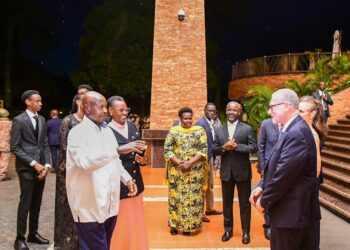The sentencing of Uganda Law Society (ULS) President Isaac Ssemakadde to two years in prison for contempt of court is continuously sending shockwaves through the legal community, raising concerns over judicial independence, freedom of expression, and the relationship between the bar and the bench.
Ssemakadde, a renowned human rights lawyer and vocal critic of judicial overreach, was convicted of contempt of court following a heated legal battle involving strong criticisms of judicial conduct. The case stemmed from statements he made regarding certain judicial officers, which the court deemed as an attack on the integrity of the judiciary. The ruling, widely seen as a harsh response to dissent, sentenced him to two years in prison, making him the first ULS President to face incarceration while in office.
Speaking on behalf of the Uganda Law Society before the media on Thursday, Vice President Asiimwe Anthony described Ssemakadde’s sentencing as a crisis that could have been prevented through open dialogue. He emphasized the need for a constructive relationship between the bar and the bench, as outlined in Chapter Eight of Uganda’s Constitution.
“The bar and bench are interconnected and interdependent components of the administration of justice. Lawyers and judges must work together to ensure justice is served for everyone,” Asiimwe stated.
He called upon Chief Justice Alfonse Owiny-Dollo to engage with ULS leadership to address grievances, warning that failure to do so could escalate tensions within the legal fraternity.
Asiimwe also highlighted concerns that Ssemakadde’s conviction threatens the fundamental right to free speech, especially for legal practitioners who hold the judiciary accountable.
“Respecting the paramountcy of Freedom of Expression is crucial in establishing a clear line of communication to avoid future conflicts. ‘Ebigambo tebita’—words don’t kill,” he emphasized, referencing a popular media slogan advocating for free speech.
ULS has urged judicial officers to avoid using legal provisions as punitive tools against members of the bar. Asiimwe stressed the importance of a democratic and inclusive judiciary that fosters transparency and accountability rather than alienating critics.
“We need a judiciary that upholds democratic principles in its internal management and in its dealings with the bar. Judicial officers must move away from divisive rhetoric and engage in open dialogue to maintain the legitimacy of the judiciary,” he stated.
In response to Ssemakadde’s sentencing, the ULS Vice President has announced plans to pursue appellate litigation to challenge the ruling. The society also intends to advocate for the election of new Judicial Service Commission (JSC) leaders who can work collaboratively with the bar and bench to rebuild trust.
Additionally, ULS has committed to establishing regular meetings and communication channels between the legal fraternity and the judiciary to prevent future misunderstandings.
Asiimwe urged that both sides must commit to restoring harmony within the legal system.
“Rebuilding trust and respect between the bar and the bench requires effort from both sides. By strengthening institutional relationships and upholding the principles of justice and democracy, we can create a more effective and just legal system.”
Meanwhile, Ssemakadde’s case remains a pivotal moment in Uganda’s legal history, raising pressing questions about judicial impartiality, the limits of free speech, and the evolving dynamics between legal practitioners and the judiciary. The coming months will be crucial in determining whether dialogue prevails over division.
Do you have a story in your community or an opinion to share with us: Email us at editorial@watchdoguganda.com













